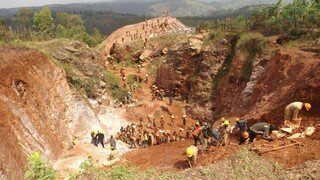 COVID is directly affecting the livelihoods, health and long-term outcomes of artisanal and small-scale mining (ASM) communities where ITSCI operates. The pandemic has caused supply chain disruption, low market prices and suspension and interruptions to mining activities. Already economically precarious before the pandemic, ASM communities are facing even more reduced circumstances. Moreover, every miner supports on average five further individuals, amplifying the effects of this crisis. To put this in perspective, ITSCI works with 80,000 individual miners, supporting around 5 million people with their activities.
COVID is directly affecting the livelihoods, health and long-term outcomes of artisanal and small-scale mining (ASM) communities where ITSCI operates. The pandemic has caused supply chain disruption, low market prices and suspension and interruptions to mining activities. Already economically precarious before the pandemic, ASM communities are facing even more reduced circumstances. Moreover, every miner supports on average five further individuals, amplifying the effects of this crisis. To put this in perspective, ITSCI works with 80,000 individual miners, supporting around 5 million people with their activities.
Economic shocks due to COVID
Drops in both supply and demand of minerals due to COVID compound the economic challenges for central Africa. Mineral exporters in the region experienced a 27% drop in business compared to Q1 2019 due to reduced activity in Asia. Metal prices have declined sharply due to volatile financial markets and COVID concerns; and miners absorbed a sudden ~30% tin price drop in mid-March.
Mining has been affected by complicated logistical challenges related to COVID health measures and border and trade route closures. Low market prices also suppress production. Businesses across the upstream supply chain face liquidity issues, with high priced stock that they cannot afford to sell, and cash tied up in slow-moving shipments delayed by logistical problems from border closures, reduced availability for transport and similar.
In this scenario, it is likely that vital efforts to maintain due diligence systems and progress to avoid human rights abuses and insecurity will be lost as supply chain actors face stark choices in relation to maintaining responsible business and sufficient resilience for economic recovery.
Impact on ASM communities
ASM miners are also more vulnerable to COVID than the average population due to lack of health planning and higher than average rates of diseases like HIV and TB[1]. The nature of their mining activities means difficulties in social distancing and contact with many others. ASM miners already may not have access to sufficient PPE or information on how to effectively use it; making it unlikely that any additional COVID-related protections will be easily achieved. New cases of Ebola in DRC have also been confirmed by the World Health Organisation in April, adding the pandemic challenges – not least in that rumours and misinformation abound in relation to public health, making it hard to credibly communicate measures required and change behaviours.
The World Food Programme is warning of the impact of COVID on food security and nutrition in Africa, already under pressure due to changing weather patterns and locusts in east Africa. Restrictions on movement within and between countries is hindering food-related transport, as well as the labour needed for food production. Together with loss of income and health concerns, ASM communities are facing a triple, and interrelated, threat to already precarious livelihoods.
Furthermore, reduced circumstances will drive instability and erode basic rights in the region. When schools are closed or families cannot afford school, children are more likely to be present at mine sites. Lack of mineral transport doubles the cost of return journeys with goods from towns to mining areas, causing significant local inflation. Migration as a result of inflation or drop in activity at mines increases local tensions.
Ultimately, drops in mineral earnings may stimulate return to criminal behaviour and armed groups, and interruption of formal markets may fuel shadow economies. Local youth will be more easily co-opted by criminal and armed groups as their circumstances narrow further. Criminal and armed groups will have more opportunity to control transport routes, and access resources through activities such as extortion. Even rogue elements of State services may take the opportunity to increase illegal taxation on the basis of unclear COVID control rules. The situation could cause a downward spiral of insecurity, reduced economic development and increased human rights concerns.
Regional socio-economic development
Long term, the crisis will have an impact on regional development outcomes. Growth in Sub-Saharan Africa has been significantly impacted by the on-going coronavirus outbreak and is forecast to fall sharply in 2020, stemming from weaker exports from the global economic downturn[2]. In this scenario, the recovery of the industry will be essential for long-term socio-economic development and improving the livelihoods of ASM communities. ITSCI has facilitated an average of US$380 million in metal value each year, from programme implementation costs of US$8.4 million a year – a multiplier of 46 times. It is more important than ever that ITSCI can maintain this contribution, and support responsible business and economic recovery.
[1] See for instance http://www.stoptb.org/assets/documents/resources/publications/acsm/kp_miners_spreads.pdf.
[2] https://www.worldbank.org/en/country/drc/overview
